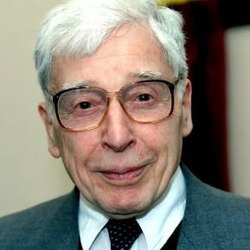Robert G. Edwards
| Sir Robert Edwards | |
|---|---|
 |
|
| Born | Robert Geoffrey Edwards 27 September 1925 Batley, England |
| Died | 10 April 2013 (aged 87) near Cambridge, England |
| Fields | |
| Institutions | |
| Alma mater | |
| Thesis | The experimental induction of heteroploidy in the mouse (1955) |
| Known for | Pioneer of in-vitro fertilisation |
| Notable awards |
|
| Spouse | Ruth Fowler Edwards |
|
Website www |
|
Sir Robert Geoffrey Edwards, CBE, FRS (27 September 1925 – 10 April 2013) was an English physiologist and pioneer in reproductive medicine, and in-vitro fertilisation (IVF) in particular. Along with the surgeon Patrick Steptoe, Edwards successfully pioneered conception through IVF, which led to the birth of Louise Brown on 25 July 1978. They founded the first IVF program for infertile patients and trained other scientists in their techniques. Edwards was the founding editor-in-chief of Human Reproduction in 1986. In 2010, Edwards was awarded the Nobel Prize in Physiology or Medicine "for the development of in vitro fertilization".
Edwards was born in Batley, Yorkshire, and attended Manchester Central High School on Whitworth Street in central Manchester, after which he served in the British Army, and then completed his undergraduate studies in biology, graduating with an Ordinary degree at Bangor University. He studied at the Institute of Animal Genetics and Embryology at the University of Edinburgh, where he was awarded a PhD in 1955. After a year as a postdoctoral research fellow at the California Institute of Technology he joined the scientific staff of the National Institute for Medical Research at Mill Hill. After a further year at the University of Glasgow, in 1963 he moved to the University of Cambridge as Ford Foundation Research Fellow at the Department of Physiology, and a member of Churchill College, Cambridge. He was appointed Reader in physiology in 1969.
...
Wikipedia
